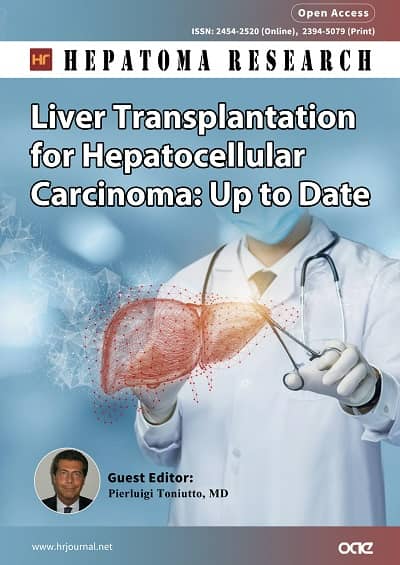
Topic: Liver Transplantation for Hepatocellular Carcinoma: Up to Date
A Special Issue of Hepatoma Research
ISSN 2454-2520 (Online) 2394-5079 (Print)
Submission deadline: 20 May 2023
Guest Editor(s)
Special Issue Introduction
Hepatocellular carcinoma (HCC) is the most common primary liver tumor and is the fourth leading cause of cancer mortality worldwide. Historically, the major predisposing factor for the development of HCC was cirrhosis, mainly due to chronic hepatitis C (HCV) and B (HBV) virus infections, and exposure to toxins such as alcohol. In Asian countries, chronic HBV infection acquired at a young age affects the onset of HCC, even in the absence of cirrhosis. With the availability of new antiviral therapies for HCV and HBV, the incidence of hepatitis virus-induced HCC is expected to decrease in the future. Thus, a new epidemiological scenario is emerging worldwide. Nonalcoholic fatty liver disease (NAFLD) has now become a relevant health care problem, because it is present in approximately 25% of adults in the general population, in nearly 70% of patients with type 2 diabetes and in all obese patients. The histologic spectrum of NAFLD ranges from simple steatosis to nonalcoholic steatohepatitis (NASH), fibrosis, and finally cirrhosis. Growing evidence has supported a trend toward NASH overtaking viral hepatitis as the leading cause of HCC in western countries, and the most rapidly growing indication of liver transplant in patients with HCC. Besides the changing epidemiological scenario in HCC, treatment options for this disease have recently increased following the introduction of new systemic therapies. If the more appropriate treatment for HCC may be guided by tumor stage, no clear indications are available regarding how to combine different therapies or how to use them sequentially. These factors are particularly important in the context of liver transplantation for HCC, since all of them may be used before and after liver transplant as neoadjuvant and adjuvant treatments, respectively. The scarcity of liver donors for patients with HCC leads to an increase in the use of living donors and donors after circulatory death for this transplant indication.
The purpose of this Special Issue of Hepatoma Research is to highlight in detail all the aforementioned issues, summarized as the following proposed topics:
● Emerging risk factors for HCC development: implications for screening policies and diagnosis
● New algorithms for selecting patients with HCC for liver transplantation
● Neoadjuvant treatments for HCC before liver transplantation
● Tailored immunosuppression in liver transplanted patients for HCC
● Potential role of adjuvant treatments in liver transplanted patients for HCC
● Treatment for HCC recurrence after liver transplantation
● Living donor liver transplantation in patients with HCC
● Use of donors after circulatory death in liver transplantation for HCC
● Criteria for transplantation in non-cirrhotic patients
● Definition of cirrhosis: does it have relevance to HCC treatment?
● Tobacco alone and with alcohol as risk factors for HCC development: implications for prevention and screening policies
● Risk factors for HCC development after DAA-treatment
● Hepatocyte division or not division: how to explain chromosomal aberration development in dividing cells
● Hepatocyte ploidy and liver integrity
The purpose of this Special Issue of Hepatoma Research is to highlight in detail all the aforementioned issues, summarized as the following proposed topics:
● Emerging risk factors for HCC development: implications for screening policies and diagnosis
● New algorithms for selecting patients with HCC for liver transplantation
● Neoadjuvant treatments for HCC before liver transplantation
● Tailored immunosuppression in liver transplanted patients for HCC
● Potential role of adjuvant treatments in liver transplanted patients for HCC
● Treatment for HCC recurrence after liver transplantation
● Living donor liver transplantation in patients with HCC
● Use of donors after circulatory death in liver transplantation for HCC
● Criteria for transplantation in non-cirrhotic patients
● Definition of cirrhosis: does it have relevance to HCC treatment?
● Tobacco alone and with alcohol as risk factors for HCC development: implications for prevention and screening policies
● Risk factors for HCC development after DAA-treatment
● Hepatocyte division or not division: how to explain chromosomal aberration development in dividing cells
● Hepatocyte ploidy and liver integrity
Submission Deadline
20 May 2023
Submission Information
For Author Instructions, please refer to https://www.oaepublish.com/hr/author_instructions
For Online Submission, please login at https://oaemesas.com/login?JournalId=hr&SpecialIssueId=hr220907
Submission Deadline: 20 May 2023
Contacts: Delphine Wong, Assistant Editor, Delphine@hrpublishing.net





